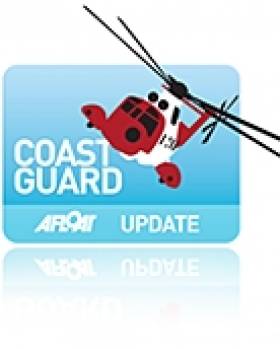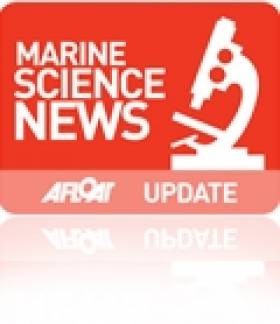Displaying items by tag: Ambassador
French Navy Support Ship Calls to Cork City Quays While Ambassador Visits Naval Base
Cork City Quays is where a French Navy ship is berthed having arrived from a naval base in Brest, Brittany to the Munster city for an extended weekend port of call, writes Jehan Ashmore
After a voyage of two days in the Celtic Sea, the FNS Garonne (A605) arrived to Cork Harbour on Friday morning.
The foreign naval ship passed the Irish Naval Service Naval Base in Haubowline in lower Cork Harbour when en-route to the city via Lough Mahon.
In 2020 the FS Garonne became the final unit of a quartet of custom-built 'Loire' class specialist offshore support and assistance ships to enter commission and serve the requirements of the French Navy.
The ship was ordered in 2016 to the Kership shipyard and is based on the design of a civilian class Multi Purpose-Supply Vessel (MPV) with the standard large aft-stern deck for supplies and towing duties.
Among the roles is support diving operations and dealing with pollution in the aftermath of a spillage at sea. In addition to assisting submarines and surface ships, including salvage operations.
On the same day of the 70m auxiliary vessel's arrival at North Custom House Quay, the Ambassador of France to Ireland, Vincent Guerend made a visit to the Naval Base.
The ambassador was received by the honour guard and was briefed by Commodore Malone about the Naval Service. In addition the role of both neighbouring nations on the Atlantic arc of north-west Europe where co-operation of maritime operations is key.
In addition the ambassador was welcomed on board L.É. George Bernard Shaw (P64) the newest of the quartet of Offshore Patrol Vessels (OPV)/P60 class which entered service in 2018.
FNS Garonne is to remain in port overnight and where on the adjacent quay to the south, is Cork City Marina which is conveniently located close to facilities and tourist attractions.
Likewise, the city is where the 17 personnel have had crew rest and recreation before the naval visitor is scheduled to depart tomorrow morning.
Russian Ambassador Proposes Reward for Swanland Rescuers
#COASTGUARD - Russia's ambassador to Britain has proposed rewarding rescuers involved in the search for missing seamen in the Irish Sea last week following the sinking of the cargo ship Swanland.
As previously reported on Afloat.ie, the cargo vessel - carrying 3,000 tonnes of limestone - went down some 10 miles west of the Lleyn peninsula in north Wales in the early hours of last Sunday.
Two of the eight crew, who were all Russian, were recovered from the sea. A third was found deceased, while the remaining five are still missing.
As many as 11 coastguard rescue teams were involved in the search operation, which also saw an RAF rescue helicopter - piloted by Prince William - lend assistance.
At a meeting with the two rescued sailors in London last Wednesday, Ambassador Alexander Yakovenko commented: “What if we propose [the rescuers] to be rewarded by the Russian side?”
Russian news agency RIA Novosti has more on the story HERE.
U.S. Nobel Laureate Visits Marine Institute in Galway
The Marine Institute headquarters at Oranmore, Co. Galway was honoured last Saturday (6th November) by a visit from US Energy Secretary Prof. Steven Chu, himself a Nobel Prize-winning physicist and long-time advocate of alternative sources of sustainable energy.
This is the latest in a number of VIP visits to the Institute this year, which have included EU-Commissioner for Research, Innovation and Science Máire Geoghegan-Quinn and the Ambassadors to Ireland of both the USA and the United Kingdom, reflecting the growing international recognition of the Institute as a centre of excellence.
During his visit, Professor Chu was briefed by the Institute's CEO Dr Peter Heffernan and members of his senior management team on the Institute's work regarding ocean renewable energy, seabed observatories and the application of "Smart Technology" to ocean monitoring and climate change through such projects as SmartBay and SmartCoast.
He was also briefed on the results of the Irish National Seabed Survey which, at the time of its execution was the largest civilian mapping project in the world, and was given copies of "The Real Map of Ireland" showing the extent of Ireland's underwater territory.
Of particular interest to Prof. Chu, following the recent oil spill in the Gulf of Mexico, was a discussion on the use of new and developing technologies that might allow the deployment of sensor devices on the seabed to monitor offshore oil wells.






























































